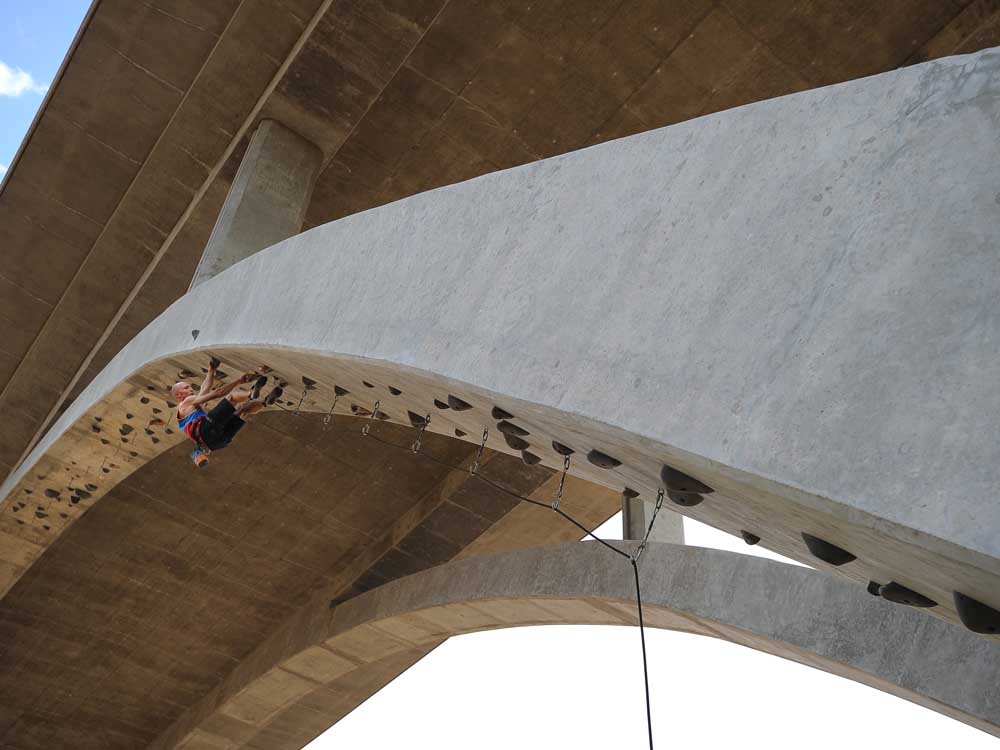Redmond halts climbing on Maple Avenue Bridge
Published 12:00 am Tuesday, September 20, 2016

- Ryan Brennecke / The BulletinRyan Palo, 32, of Bend, makes his way up the Maple Bridge Arches climbing route shortly after it was officially opened to the public in August 2015. The route is a challenging, overhanging sport climb that has been installed on one of the arches of Maple Avenue Bridge that runs across Dry Canyon Park in Redmond.
When a legally blind runner injured herself in 2009 after stepping in a hole in a Portland park, no one foresaw it would lead to the closure of Redmond’s acclaimed recreational climbing route that spans the underside of Maple Avenue Bridge.
But a state Supreme Court decision in March that stemmed from the incident has caused insurance companies and the property owners whose parks and recreational property they insure to reconsider these venues — Maple Avenue Bridge included.
The court’s decision, which found the runner could sue the city employee who dug the hole, is behind the July closure of Maple Bridge Arches Climbing Project. Prior to the ruling, it was thought employees and volunteers would be protected from liability along with the owners of the free recreational facilities that hire them.
The climbing route, which spans Redmond’s Dry Canyon Park and opened last year as one of the country’s only overhang climbing routes, was closed after Citycounty Insurance Services — Redmond’s insurance company — decided it wouldn’t continue to cover the bridge because of the increased liability stemming from the court’s decision.
“(The insurance company) called our risk management department in June and let us know that after the (Supreme Court decision) they were doing a review of their clients, and they felt there was a high risk and wouldn’t renew its coverage,” said Annie McVay, Redmond’s parks and recreation manager, adding that the city doesn’t intend for the closure to be permanent. She said the city hopes to reopen the climbing bridge next year, either by self-insuring it or through a legislative amendment that the city supports.
“We tried to get (the insurance company) to reconsider — we really think that the activity is very safe and has a lot of safeguards — but it wasn’t successful.”
When the city’s climbing project opened in July 2015, it wasn’t considered a liability risk due to the Oregon Public Use of Lands Act, which was passed in 1995. The act protects public and private property owners from liability if their land is available for the public to use free of charge.
But when the Portland runner, Emily Johnson, amended her initial lawsuit to name only the employee who dug the hole she stepped in and it went all the way to the Oregon Supreme Court, the court found that immunity isn’t extended to employees who maintain the property.
“It’s a big issue,” said Andrew Balyeat, a Bend attorney for Mt. Bachelor ski area. “It affects anyone who opens up their land for recreational purposes and doesn’t charge.”
McVay said that Maple Avenue Bridge, which was featured on the cover of Climbing Magazine earlier this year, is the only publicly owned property in Redmond that’s been closed because the insurance company considered the climbing that takes place there a “high-risk activity.” But it’s not alone in the state.
Scott Winkels, an intergovernmental relations associate for the League of Oregon Cities, said that a few playgrounds and a public track used for motocross in Pilot Rock, 20 miles south of Pendleton, have been closed, and the city of Klamath Falls decided not to pursue a bike park.
“Some cities have been looking at adding interesting recreational activities, but they’re finding it’s not a liability that they wish to take on,” he said, noting that the facilities he named weren’t comprehensive.
And it’s not just city or county property, either. School districts often open up their facilities for free community use, as do private property owners. Lisa Freiley, staff counsel for the Oregon School Boards Association, said school districts are very concerned.
The association sent out a notice after the Supreme Court decision to all state school boards informing them to be careful because of the increased liability they faced, she said, and to take care of hazards and repairs immediately.
“The decision came out, and we’re evaluating what our next steps are,” she said. “We are concerned given the court made a decision that has a substantial impact on the act. Any district that allowed the public to come in without charge to use their facilities — soccer fields, tracks, playgrounds — there are a lot.”
Elsewhere in Deschutes County, the recent court ruling hasn’t caused any public property closures. Don Horton, executive director for the Bend Park & Recreation District, said that none of the district’s facilities has been affected. The same goes for Sisters Parks & Recreation District.
Balyeat said Mt. Bachelor — which charges for use of its ski lifts but is free to the public for hiking — is aware of the decision but hasn’t taken any action.
“We’ve carefully reviewed (the decision), and we have great concerns,” he said. “And we certainly support an amendment to the statute to restore the Legislature’s intent to promote recreational activities in the state.”
Such an amendment is in the works, according to a memo sent to local governments by the Oregon Recreation and Park Association. The amendment, which is being prepared for the 2017 legislative session, restores protection to property owners’ “officers, employees, agents or volunteers,” and goes on to state that the increased liability after the Supreme Court decision is unacceptable and “can only be fixed with statute change via legislation.”
Of course, not everyone’s on board with the amendment.
Arthur Towers, a lobbyist for the Oregon Trial Lawyers Association, said the association wants to make sure that people can visit recreational facilities safely, and also that local governments and property owners can be held accountable.
“We see there being a real need to make sure that when families go out to enjoy public places they can do so with the expectation that the facilities will be properly maintained,” he said.
Editor’s note: This article has been corrected. In the original version, Scott Winkels’ name was misspelled. The location of the closed motocross track was also misstated as was the correct name of the League of Oregon Cities. The Bulletin regrets the errors.
— Reporter: 541-617-7829,
awest@bendbulletin.com






